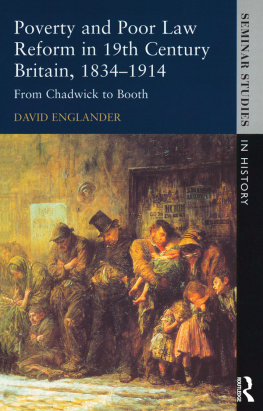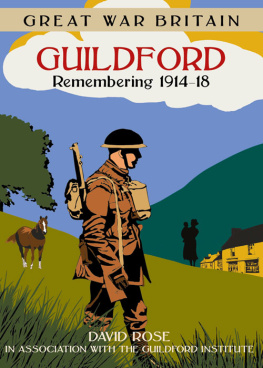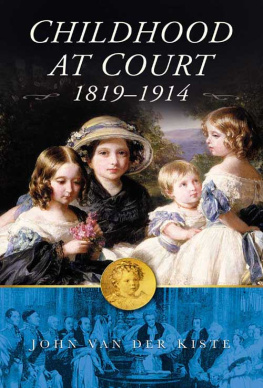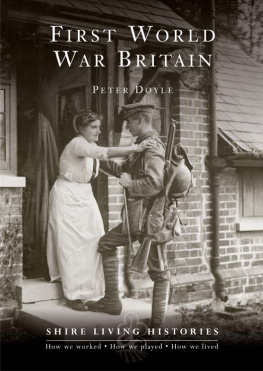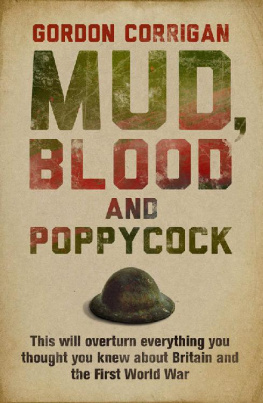PENGUIN BOOKS
PRIVATE LIVES, PUBLIC SPIRIT: BRITAIN 18701914
Jose Harris is a professor of Modern History at the University of Oxford, and currently holds a Leverhulme research professorship. Her other books include Unemployment and Politics and William Beveridge: A Biography. She has recently edited and translated Ferdinand Tonniess classic work on nineteenth century German social theory Gemeinschaft und Gesellschaft (published in English as Community and Civil Society).
THE PENGUIN SOCIAL HISTORY OF BRITAIN
General Editor: J. H. Plumb
Other tides in this series:
Maurice Keen: English Society in the Later Middle Ages 13481500
Joyce Youings: Sixteenth-Century England
Roy Porter: English Society in the Eighteenth Century
John Stevenson: British Society 19141945
Arthur Marwick: British Society Since 1945
JOSE HARRIS
PRIVATE LIVES, PUBLIC SPIRIT: BRITAIN 18701914

PENGUIN BOOKS
PENGUIN BOOKS
Published by the Penguin Group
Penguin Books Ltd, 80 Strand, London WC2R 0RL, England
Penguin Putnam Inc., 375 Hudson Street, New York, New York 10014, USA
Penguin Books Australia Ltd, Ringwood, Victoria, Australia
Penguin Books Canada Ltd, 10 Alcorn Avenue, Toronto, Ontario, Canada M4V 3B2
Penguin Books India (P) Ltd, 11 Community Centre, Panchsheel Park, New Delhi 110 017, India
Penguin Books (NZ) Ltd, Cnr Rosedale and Airborne Roads, Albany, Auckland, New Zealand
Penguin Books (South Africa) (Pty) Ltd, 24 Sturdee Avenue, Rosebank 2196 South Africa
Penguin Books Ltd, Registered Offices: 80 Strand, London WC2R 0RL, England
www.penguin.com
First published by Oxford University Press 1993
Published in Penguin Books 1994
Copyright Jose Harris, 1993
All rights reserved
The moral right of the author has been asserted
Except in the United States of America, this book is sold subject to the condition that it shall not, by way of trade or otherwise, be lent, re-sold, hired out, or otherwise circulated without the publishers prior consent in any form of binding or cover other than that in which it is published and without a similar condition including this condition being imposed on the subsequent purchaser
ISBN: 978-0-14-194157-8
FOR
ALICE MAYO
AND
FREDA
BROWN
Preface
The writing of this book coincided with something of a revolution in historical fashion. When I first set out a decade ago, many historians were still moved by a vision of social history as total historyof a discipline that aspired to track down, explain, and encapsulate the objective, interlocking, patterned reality of the past. Ten years later perceptions of the past have become much more nuanced, idiosyncratic, private, and relativist. Texts, artefacts, and language have replaced institutions, movements, and social forces as the substance of what social history is supposed to be about. To borrow a potent phrase used by Sir John Clapham about the years 186673, there has been since the early 1980s a gigantic hinge in historical perception. My own view is that the objective history of society is neither so wholly explicable as was often believed in the not-very-distant past, nor so utterly ungraspable as many appear to believe in the immediate present. Nevertheless, like all historical writing this book echoes the passing fashions of the age. My hope is that the creaking of the gigantic hinge may not be too crudely obvious.
I should like to acknowledge the help and support of colleagues, students, family, and friends. Andrew Miles and Youssef Cassis kindly lent me their (then unpublished) work in progress. My research students Mark Bevir, Sandra den Otter, and James Webster fortuitously worked upon themes which stimulated and nourished my own thoughts on this period. Fellow historians whose ideas I have borrowed or stolen are too numerous to mention, but I owe a particular debt of gratitude over many years to Pat Thane and Colin Matthew, both of whom shared with me the teaching of undergraduate courses germane to this book. Long-ago conversations with Asa Briggs, Barbara Caine, Bob and Sandra Holton, Theda Skocpol, Jay Winter, and Alan MacBriar (doubtless long forgotten by them) influenced my thinking on certain key issues. My colleague Peter Dickson kindly weeded out some overgrowths of florid prose, and made many helpful comments. Audrey Hiscock and Susan Seville typed the earlier chapters and taught me to do the later ones myself, and generally gave assistance far beyond the call of secretarial duty. Rosy Addison gave invaluable practical and moral support at a crucial moment. Sir John Plumb, the general editor of the Penguin Social History, was unfailingly patient with my slow production. I am further indebted to Colin Matthew, John Prest and Keith Thomas for identifying and correcting a number of errors, both factual and typographical, that crept into the edition published in 1993 by Oxford University Press. My husband, Jim Harris, read the text from the standpoint of the general reader, and cheered me up immensely by seeming to enjoy it. My son, Hugh, survived my immersion in Victorian literature on child care and forgave me for much neglect; but only his mounting indignation at my prolonged failure to finish this book eventually brought it to an end.
The book is dedicated to my grandmother and mother, who were born respectively at the beginning and end of the period covered. Both were keen amateur historians of their own society, and both supplied some unique personal insights. They would have found many of my ideas puzzling; but I have tried to include nothing that they would have found too grossly at odds with their sense of the subjective reality of those now vanished times.
Contents
1. Themes and Interpretations:
An Overview of British Society, 18701914
1
Themes and Interpretations: An Overview of British Society 18701914
I. C ONTINUITY AND CHANGE
Historians of the twentieth century have been sharply divided about whether the First World War was a gigantic crossroads, or merely a transient episode, in the domestic history of British society. No one doubts the importance of the war as a cluster of epic eventsmilitary, organizational, geopolitical, apocalyptic, and merely human; but whereas some see those events as profoundly changing the structure of social, political, and economic power in Britain, others argue that such shifts had already been occurring over many decades and that the war merely accelerated a less dramatic but more fundamental process of evolutionary change. The tension between these two perceptions of the waras a time bomb of total change and as a more humble pressure-cooker of gradualist evolutionhaunts the social history of the previous half-century. Were the social structure and social character of Britain in the late Victorian and Edwardian period a natural and logical prelude to the society that developed later in the twentieth century? Or was it a fundamentally different kind of society, one that was wrenched into an alternate mould by the dramatic and traumatic impact of 191419?
It is a truism to say that in all societies there are elements of both change and continuity, and Britain in the late nineteenth and early twentieth centuries was no exception; but because of the epic and overwhelming character of the First World War it is peculiarly difficult to identify the character of the earlier society except through the distorting prism of hindsight. Many features of pre-war societychanges in the structure of family life, the emergence of the labour movement, the challenge of feminism, the investigation of poverty, the rise of aesthetic modernism, and the growth of moral and religious uncertaintyseem to anticipate concerns of the later twentieth century; and it is perhaps too easy to assume that they are part of a historical continuum. On the other hand, other aspects of Edwardian lifethe fashionable predominance of a leisure aristocracy, the sheer intensity of the poverty of the poor, the omnipresence of infant death, the restricted scope of central government, and the ingenuous confidence in the future of the British Empire (and indeed of European civilization in general)seem so utterly remote from a later age that it is tempting to see them as part of a wholly vanished society, swept away by a sudden, extraneous, and unpredictable cataclysm, as utterly and irrevocably as Pompeii and Herculaneum.
Next page

